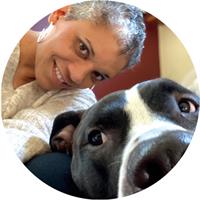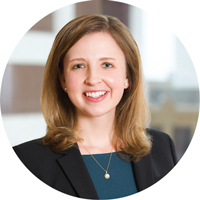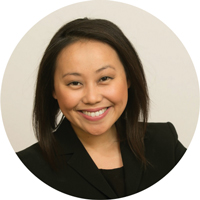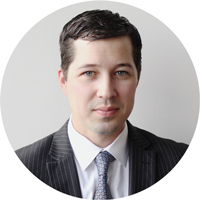
Emily Cooper, Cooper Law
First, all the ways that you thought things had to be done are not true. There are limitless ways to serve your clients and run your business well—to be creative and innovative with solutions. We serve lower- and middle-income clients in family law matters. Most have hourly wage jobs without paid time off. Being able to appear in hearings via Zoom has saved jobs, time, day care expenses, and undue stress. It proves that the old-school method of forcing everyone to appear in person in court is not required and is, in fact, an impediment to justice in some situations.
Second, your staff is not you and they all need different types and levels of support and communication. Listen to them and give them options. Like most firms, we went remote when covid hit. For me, it was great because I am an introvert and like being at home. On the other hand, for some of my staff, it was a nightmare and incredibly stressful. Making sure your team has the tools to be successful does not just mean giving them a laptop to work on. It means offering opportunities to connect in ways that provide them with the support they need.
Third, technology is essential and makes legal services more accessible. But people are still more successful with an attorney guiding them, so be sure to incorporate human interaction into your practice alongside technology. Everyone throws around the phrase “access to justice,” and most concepts to help people participate in the legal system seem to focus on providing more technological avenues to courts for low-income people. Online forms, guided interviews, and the like are touted as the way to help the poor. In general, lower-income litigants are less educated and have access to less reliable technology (internet, computers, etc) than those who have more money. Yet if you have money, you get a human attorney to do the work, answer your questions, fill out the forms, and interpret the issues for you. Covid has demonstrated to me that technology is a great way to even the playing field, but that to really provide access to justice requires the same real human assistance regardless of income level.

Anne Haaland, Henson Efron
I believe the wisest investment you can make is to invest your time in people, and the pandemic only reinforced that—personally and professionally. As a family lawyer, the human element of understanding my client and their goals is critical, and to do so remotely has been challenging. During the pandemic, I have had to be very intentional about my conversations with clients by phone, Zoom, or in person to make sure I am understanding the full picture. An exchange of emails can never give me the same quality of information as a phone call, video call, or (best yet) meeting with my client. Taking the time to have deep conversations with clients builds trust and helps me build their case. Now that my colleagues and I are returning to the office, I have been reminded of how valuable in-person brainstorming is for complex legal issues, not to mention the camaraderie. When we remember the human element and take the time to have the important conversations, we are all better for it, as humans and as attorneys.
 Susie Vang, Southern Minnesota Regional Legal Services (SMRLS)
Susie Vang, Southern Minnesota Regional Legal Services (SMRLS)
Like millions of Americans, I watched helplessly as the number of covid-19 cases spiraled out of control in March 2020. I had just returned to work from a leave when staff members were instructed to work from home. Working remotely and trying to balance being a wife and mom to two young children, including a medically fragile child, proved to be challenging. Oftentimes, I felt like I was just surviving, darting away from the cries of my children during virtual work meetings.
While it was natural catering to the needs of my children, fielding early morning client calls, and putting together care packages for people who had fallen on hard times during the pandemic, I had completely forgotten about my own needs. Despite the number of CLE trainings on wellness and self-care that I had attended over the years, a “successful” day merely meant completing routine tasks and managing to put another day behind me.
It wasn’t until I had an unexpected, life-threatening medical emergency that I was forced to make myself a priority. Weeks after my hospitalization, my sister invited me to play pickleball, a growing racquet sport. I was hooked. Now, I power through my “to dos” trying to reward myself with a game of pickleball a few times a week. The warmth of the sun feels amazing. The drench of sweat is cleansing. I cherish the new friendships.
I emerged a better and more patient legal aid attorney because I learned to carve out time for myself amid chaos. Instead of rushing straight to routine legal questions, I simply start phone calls with: “Hi, how are you doing?” The responses have been overwhelming. Beyond their immigration cases, some clients were just surviving like me. Several lost jobs. Some contracted covid. Some were grappling with the loss of family members during the pandemic. The stories of struggle were humbling and forced me to view them not just as people who need legal assistance, but as human beings trying their best amid chaos.
Like the rest of the world, I hid from covid in fear of dying. But, as the pandemic begins to wind down, I am more than just surviving. My feet are planted. I am alive.
 Adam Johnson, Lundgren Johnson
Adam Johnson, Lundgren Johnson
In his Devil’s Dictionary, Ambrose Bierce states that “[t]he plague as we of today have the happiness to know it is merely Nature’s fortuitous manifestation of her purposeless objectionableness.” And that pretty much sums it up, doesn’t it? There have been worse and more tumultuous precedents set in the course of human events, but with respect to my own existence, the trials imposed by the covid-19 pandemic were very much unprecedented. As a father of two during distance “learning,” and a partner in a two-man firm, I found the pandemic experience to shift quickly from apparent novelty to real hardship. From my vantage, things were tough all over for a lot of people.
At the same time, I am fortunate to have the world’s greatest business partner and fellow lawyer. We managed to survive, as we always have, and I credit the lion’s share of our success in this regard to his wisdom and fortitude. Though I already knew it, the pandemic experience confirmed that our law firm partnership is really a great one. I like to think that my knowledge of this fact will continue to make me a better lawyer.
EMILY COOPER, a 1996 honors graduate of the University of Minnesota Law School, is the founder of Cooper Law, a sliding-scale-fees law firm based in Minneapolis that practices in the areas of family law and Social Security-related matters. EMILY@COOPERLAWMN.COM
ANNE HAALAND is a shareholder at Henson & Efron, P.A., where she practices exclusively in the area of family law. Minnesota Lawyer honored her as a 2020 Up & Coming Attorney, and she has been recognized as a Minnesota Super Lawyers--Rising Star (2017-2021) and Best Lawyers: Ones to Watch: Family Law (2021-2022). AHAALAND@HENSONEFRON.COM
SUSIE NAOBLIAVANG THAO has worked as an immigration attorney with Southern Minnesota Regional Legal Services since 2012. Prior to law school at William Mitchell, Susie worked as a reporter for The Fresno Bee in Fresno, Calif. Susie loves spending time with her husband, two daughters, and dogs. SUSIE.VANG@SMRLS.ORG
ADAM JOHNSON practices criminal defense at Lundgren & Johnson, PSC, in Minneapolis. ADAM@LUNDGRENJOHNSON.COM